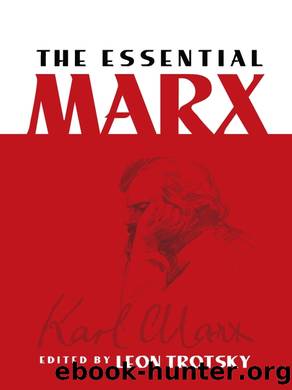The Essential Marx by Karl Marx

Author:Karl Marx [Marx, Karl]
Language: eng
Format: epub, azw3
ISBN: 9780486122311
Publisher: Dover Publications
Published: 2012-10-06T04:00:00+00:00
8. The Working Day
The sum of the necessary labour and the surplus-labour, i.e., of the periods of time during which the workman replaces the value of his labour-power, and produces the surplus-value, this sum constitutes the actual time during which he works, i.e., the working day.
The working day is not a constant, but a variable quantity. One of its parts, certainly, is determined by the working time required for the reproduction of the labour-power of the labourer himself. But its total amount varies with the duration of the surplus-labor. The working day is, therefore, determinable, but is, per se, indeterminate.
The minimum limit is, however, not determinable. On the other hand, the working day has a maximum limit. It cannot be prolonged beyond a certain point. Within the 24 hours of the natural day a man can expend only a definite quantity of his vital force. During part of the day this force must rest, sleep; during another part the man has to satisfy other physical needs. Besides these purely physical limitations, the extension of the working day encounters moral ones. The labourer needs time for satisfying his intellectual and social wants, the extent and number of which are conditioned by the general state of social advancement. The variation of the working day fluctuates, therefore, within physical and social bounds. But both these limiting conditions are of a very elastic nature, and allow the greatest latitude.
The capitalist has bought the labour-power at its day-rate. To him its use-value belongs during one working day. He has thus acquired the right to make the labourer work for him during one day. But what is a working day?
The capitalist has his own views of the necessary limit of the working day. As capitalist, he is only capital personified. His soul is the soul of capital. But capital has one single life impulse, the tendency to create value and surplus-value, to make its constant factor, the means of production, absorb the greatest possible amount of surplus-labour. Capital is dead labour, that vampire-like, only lives by sucking living labour, and lives the more, the more labour it sucks. The time during which the labourer works, is the time during which the capitalist consumes the labour-power he has purchased of him. If the labourer consumes his disposable time for himself, he robs the capitalist. The capitalist then takes his stand on the law of the exchange of commodities. He, like all other buyers, seeks to get the greatest possible benefit out of the use-value of his commodity.
Suddenly the voice of the labourer rises: The commodity that I have sold to you differs from the crowd of other commodities, in that its use creates value, and a value greater than its own. That is why you bought it. That which on your side appears a spontaneous expansion of capital, is on mine extra expenditure of labour-power. You and I know on the market only one law, that of the exchange of commodities. And the consumption of the commodity belongs not to the seller, but to the buyer.
Download
This site does not store any files on its server. We only index and link to content provided by other sites. Please contact the content providers to delete copyright contents if any and email us, we'll remove relevant links or contents immediately.
| Anarchism | Communism & Socialism |
| Conservatism & Liberalism | Democracy |
| Fascism | Libertarianism |
| Nationalism | Radicalism |
| Utopian |
The Secret History by Donna Tartt(16623)
The Social Justice Warrior Handbook by Lisa De Pasquale(11489)
Thirteen Reasons Why by Jay Asher(7788)
This Is How You Lose Her by Junot Diaz(5772)
Weapons of Math Destruction by Cathy O'Neil(5037)
Zero to One by Peter Thiel(4824)
The Myth of the Strong Leader by Archie Brown(4789)
Promise Me, Dad by Joe Biden(4447)
Beartown by Fredrik Backman(4419)
Stone's Rules by Roger Stone(4415)
How Democracies Die by Steven Levitsky & Daniel Ziblatt(4399)
The Fire Next Time by James Baldwin(4343)
100 Deadly Skills by Clint Emerson(4079)
A Higher Loyalty: Truth, Lies, and Leadership by James Comey(4033)
Rise and Kill First by Ronen Bergman(4012)
The David Icke Guide to the Global Conspiracy (and how to end it) by David Icke(3882)
The Farm by Tom Rob Smith(3872)
Secrecy World by Jake Bernstein(3782)
The Doomsday Machine by Daniel Ellsberg(3731)
